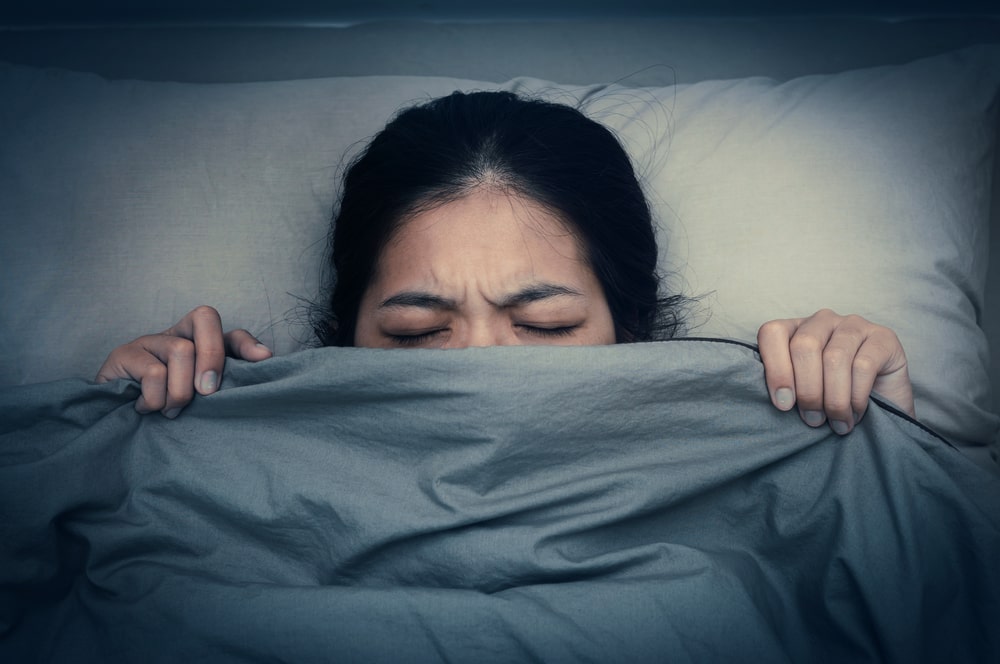Bipolar disorder is listed in the Diagnostic and Statistical Manual of Mental Disorders, Fifth Edition (DSM-5) as a chronic mental health illness and is classified as a mood disorder. The National Institute of Mental Health explains that bipolar disorder “causes unusual shifts in mood, energy, activity levels, concentration, and the ability to carry out day-to-day tasks.” It is characterized by noticeable, unprovoked, sometimes extreme, changes in mood and behavior, that typically present as severe episodic mood swings, shifting between emotional highs (manias) to emotional lows (depressions) with intervals of stable, neutral moods.
Nightmares & Night Terrors
A nightmare is defined as “a terrifying dream in which the dreamer experiences feelings of helplessness, extreme anxiety, sorrow, etc.” They are disturbing, well-remembered dreams. In those with bipolar disorder, researchers believe that nightmares may predict upcoming mood swings. People with bipolar disorder also commonly face night terrors. A night terror is not a dream, but rather an abrupt awakening accompanied by physical symptoms. The American Academy of Sleep Medicine explains that a person experiencing a night terror will suddenly begin to exhibit signs of panic and terror while sleeping (e.g., screaming, flailing, kicking, etc.) as well as other symptoms such as rapid heart rate and breathing, flushing of the skin, sweating, dilation of the pupils, and tensing of the muscles. During a night terror, an individual awakes in a state of confused and inconsolable terror, which they may or may recall in the morning.
Signs and Symptoms
According to the diagnostic criteria outlined in the DSM-5, bipolar disorder is diagnosed when a person experiences three or more manic symptoms and five or more depressive symptoms. Examples of signs and symptoms of bipolar disorder could include, but are not limited to, any combination of the following, provided by the Mayo Clinic:
- Signs and symptoms during a mania or hypomania state:
-
-
- Increased energy
- Euphoria
- Agitation
- Easily distractible
- Decreased need for sleep
- Excessive talkativeness
- Lack of judgment
- Atypically upbeat
- Difficulties at work
- Shift in social activities
- Psychosis
- Relationship challenges
-
- Signs and symptoms of a major depressive episode:
- Inability to experience pleasure or loss of interest in social activities
- Irritability
- Crying spells (frequent and random crying throughout the day)
- Depressed mood
- Feelings of hopelessness
- Loss of energy
- Shift in sleeping habits (either sleeping too much or experiencing insomnia)
- Slowed behavior
- Restlessness
- Feelings of excessive guilt
- Inability to think clearly
- Indecisiveness
- Suicidal ideations
- Lack of energy
- Shift in appetite resulting in drastic weight loss or weight gain
As is noted in both manic symptoms and depressive symptoms, is clear that disturbed sleep is common in people who have bipolar disorder. Still, the type of sleep disturbances that may occur typically depends on whether an individual is experiencing a manic or depressive episode.
Treatment In Calabasas
Calabasas is a city in California. It is a well-known suburb of Los Angeles, located west of the San Fernando Valley and north of the Santa Monica Mountains. Over the past decade, the city of Calabasas has grown in its reputation for luxury as well as for privacy which makes it a hidden gem for residential living for society’s elite, and one of the most desirable destinations in Los Angeles County. It is also home to a plethora of highly qualified mental health clinicians providing an array of therapeutic services and treatment options.
The information above is provided for the use of informational purposes only. The above content is not to be substituted for professional advice, diagnosis, or treatment, as in no way is it intended as an attempt to practice medicine, give specific medical advice, including, without limitation, advice concerning the topic of mental health. As such, please do not use any material provided above to disregard professional advice or delay seeking treatment.




